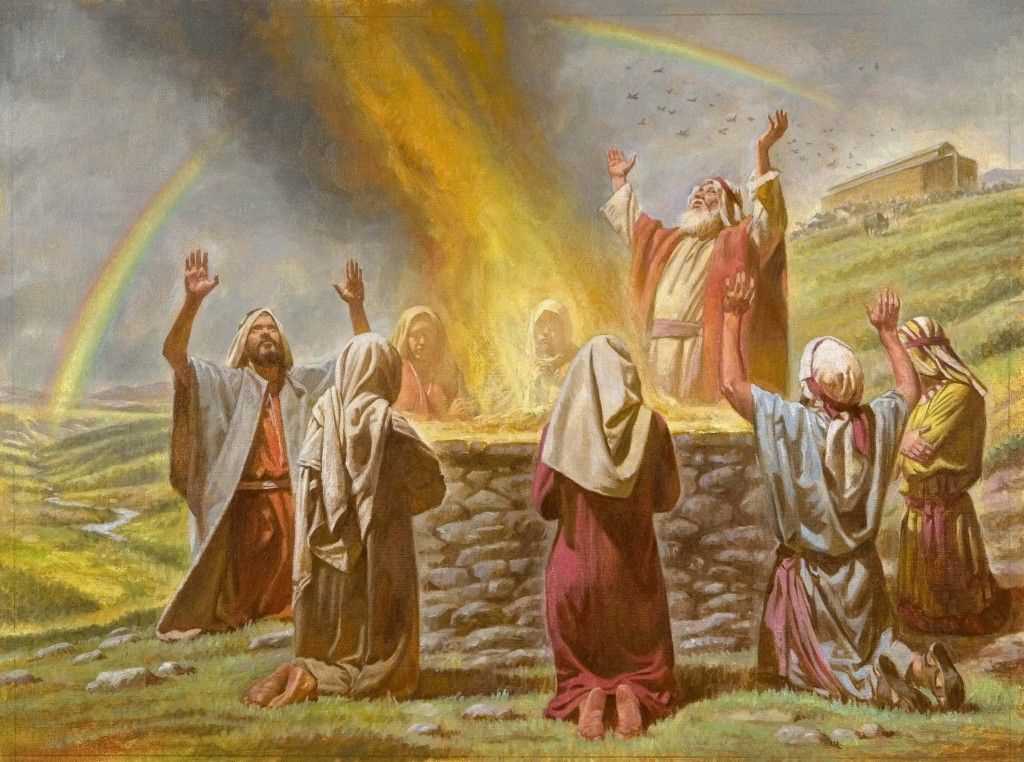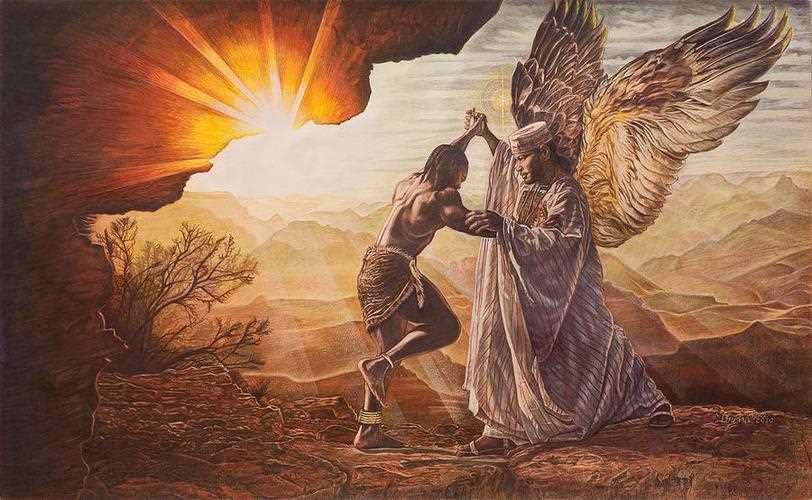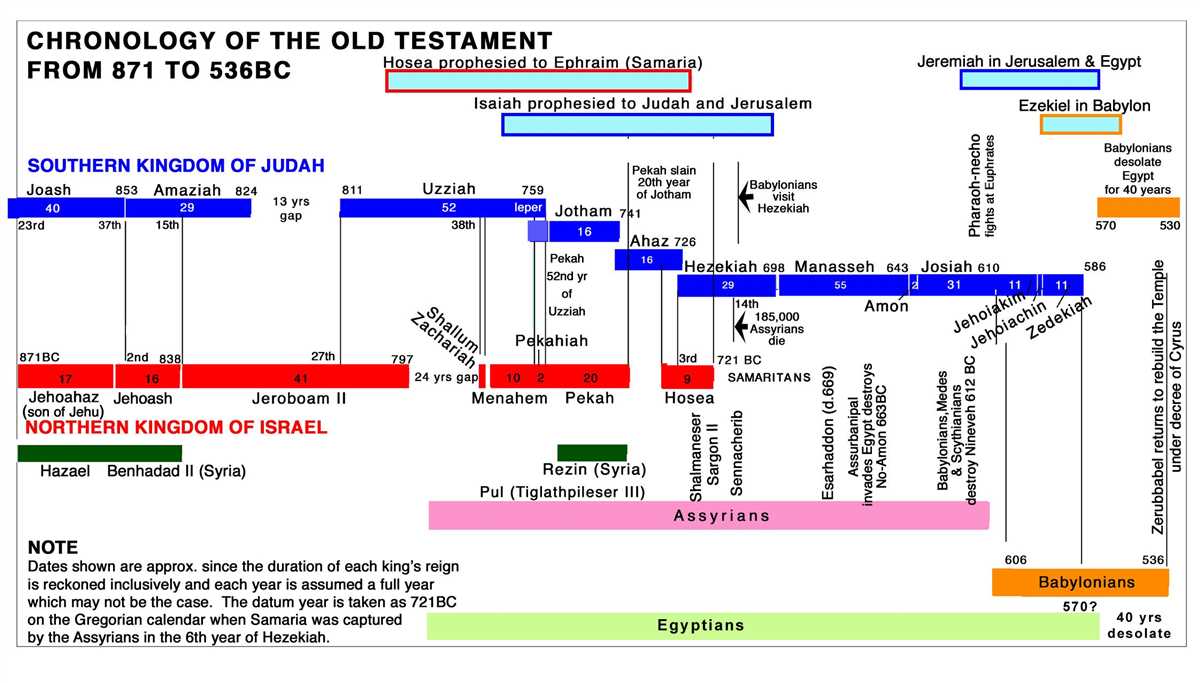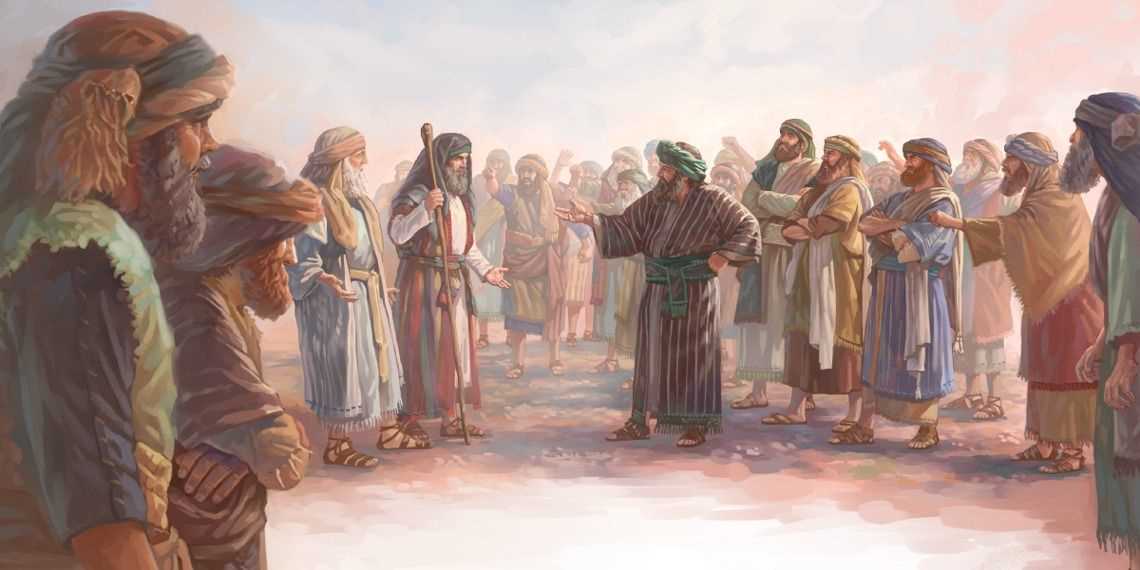
The Old Testament, also known as the Hebrew Bible, is a collection of religious texts that form the sacred scriptures of Judaism and are also considered important by Christians. Comprising of various books, the Old Testament provides a rich and diverse insight into the history, culture, and beliefs of ancient civilizations.
Encountering the Old Testament can be a fascinating journey into the origins of human civilization and the development of religious thought. These ancient texts, written over a span of many centuries, contain stories, laws, prophecies, and poems that explore the nature of God, the relationship between humanity and divinity, as well as the struggles and triumphs of the people of Israel.
Studying the Old Testament can offer a deeper understanding of the foundations of Western culture, as many of its stories and themes have profoundly influenced literature, art, and philosophy throughout history. From the creation narratives in Genesis to the wisdom literature in Proverbs and Ecclesiastes, the Old Testament provides timeless wisdom and profound insights into the human condition.
Understanding the Old Testament
The Old Testament is a collection of religious texts that form the first part of the Christian Bible. It consists of various genres, including historical accounts, prophecies, poetry, and wisdom literature. To truly understand the Old Testament, it is important to study its historical and cultural context, as well as the literary techniques used by the authors.
One essential aspect of understanding the Old Testament is recognizing its significance as a religious text for the Jewish people. For them, it is not just a historical document, but a sacred scripture that contains the revelations of God. By delving into the Jewish traditions and beliefs, we can gain a deeper understanding of the Old Testament and its teachings.
When approaching the Old Testament, it is crucial to interpret it within its own historical and cultural context. This means considering the customs, traditions, and societal norms of the time in which the texts were written. Additionally, understanding the literary techniques used by the authors, such as symbolism, metaphors, and parallelism, helps us grasp the intended meanings of the passages.
An important approach to understanding the Old Testament is recognizing the interconnectedness of its various books. It is a collection of diverse writings that were authored by different individuals over many centuries. By studying the connections between the books, recurring themes, and the overall narrative arc, we can gain insights into the overarching message and purpose of the Old Testament.
In summary, understanding the Old Testament requires a multifaceted approach that considers its historical and cultural context, its significance for the Jewish people, the literary techniques used by the authors, and the interconnectedness of its various books. By studying these aspects, we can gain a deeper appreciation for the rich and complex text that continues to shape religious and cultural traditions around the world.
The Origins of the Old Testament
The Old Testament, also known as the Hebrew Bible, is a collection of religious texts that trace the history, laws, and beliefs of the ancient Israelites. It is a foundational text for the Jewish faith and is also considered sacred by Christians. The origins of the Old Testament can be traced back to ancient Mesopotamia, where the Israelites lived and interacted with other civilizations.
The Old Testament is composed of various books, written by different authors over the course of several centuries. These books were originally written in Hebrew, with some portions also in Aramaic. The earliest writings in the Old Testament are believed to have been composed around the 12th century BCE, while the latest writings date to the 2nd century BCE. These writings were not originally compiled into a single volume, but were later organized and grouped into different sections, including the Torah (the first five books), the Prophets, and the Writings, forming the canon of the Hebrew Bible.
One of the key features of the Old Testament is its narrative of the history and religious experiences of the Israelite people. The stories in the Old Testament cover a wide range of topics, including the creation of the world, the lives of the patriarchs and matriarchs, the exodus from Egypt, the establishment of the Israelite monarchy, and the Babylonian exile. These stories are believed to have been passed down orally through generations before being written down and preserved in the biblical texts.
- The Old Testament reflects the cultural, social, and religious context of the Israelite people. It contains laws and commandments that governed the daily lives of the Israelites, such as dietary restrictions, observance of Sabbath, and rules for worship. It also includes poetic hymns, prayers, and prophetic messages that express the Israelites’ relationship with God and their understanding of their identity as God’s chosen people.
- The Old Testament has had a profound impact on the development of Western civilization, influencing literature, art, and religious thought. Its stories and teachings continue to be studied and analyzed by scholars and believers alike, providing insights into the history, culture, and beliefs of ancient Israel.
Key Themes in the Old Testament

The Old Testament encompasses a wide range of themes and ideas that are integral to the understanding of biblical teachings and history. From the creation story to prophecies of the future, this collection of writings offers a rich tapestry of themes that continue to resonate with believers today.
One of the key themes in the Old Testament is the concept of covenant. Yahweh, the God of Israel, establishes a covenant or agreement with his chosen people, promising to be their God and to bless and protect them. This covenant is not only a legal contract but also a deeply personal and relational bond between God and his people. The theme of covenant runs throughout the Old Testament, highlighting the faithfulness and steadfastness of God in keeping his promises.
Another prominent theme in the Old Testament is the idea of redemption and deliverance. The Hebrew Scriptures depict a God who rescues his people from slavery, oppression, and exile. From the Exodus narrative to the prophetic writings, the Old Testament reveals God’s desire to save and restore his people. This theme of redemption points to the ultimate deliverance found in Jesus Christ, who offers salvation to all who believe.
Additionally, the Old Testament explores the theme of justice and righteousness. God’s laws and commandments form the basis for a just and righteous society, where the vulnerable are protected and the oppressed are vindicated. This emphasis on social justice is seen in the prophetic writings, which call for the fair treatment of the poor, widows, and orphans. The Old Testament reminds believers of their responsibility to pursue justice and righteousness in their own lives and in society as a whole.
The Old Testament also addresses the theme of wisdom and the pursuit of understanding. The book of Proverbs, for example, offers practical wisdom for daily living, while the Psalms explore the depths of human emotions and experiences. Wisdom literature encourages believers to seek after knowledge, discernment, and understanding, acknowledging that true wisdom comes from God alone. This theme serves as a reminder of the importance of seeking God’s guidance and relying on His wisdom in all aspects of life.
These are just a few of the key themes found in the Old Testament. Through the exploration of these themes, believers can gain a deeper understanding of God’s character, his relationship with his people, and his plan for redemption. The Old Testament continues to inspire and challenge believers today, offering timeless wisdom and insights into the nature of God and the human condition.
An Overview of the Old Testament Books
The Old Testament, also known as the Hebrew Bible, is a collection of sacred texts that holds great significance in Judaism, Christianity, and Islam. It is composed of various books written over a span of centuries, documenting the history, religious laws, prophecies, poetry, and wisdom of the ancient Israelites.
The Old Testament is divided into several categories, including the Pentateuch (Torah), Historical Books, Poetry and Wisdom Books, Major Prophets, and Minor Prophets. Each category consists of multiple books, each serving a unique purpose and providing insights into different aspects of the Israelite culture and religious practices.
The Pentateuch (Torah)
The Pentateuch, the first five books of the Old Testament, is foundational to both Judaism and Christianity. These books, including Genesis, Exodus, Leviticus, Numbers, and Deuteronomy, are attributed to Moses and contain the creation story, the emergence of the Israelites, the exodus from Egypt, and the giving of the Mosaic Law.
Historical Books
The Historical Books of the Old Testament, such as Joshua, Judges, Samuel, Kings, Ezra, Nehemiah, and Chronicles, provide a historical account of the Israelites from the conquest of Canaan to the Babylonian exile. These books detail the rise and fall of different kingdoms, the reigns of various kings, and the struggles faced by the Israelites in maintaining their faith and identity.
Poetry and Wisdom Books
The Poetry and Wisdom Books in the Old Testament include Psalms, Proverbs, Job, Ecclesiastes, and the Song of Solomon. These books contain poetic and philosophical reflections on various aspects of life, including human suffering, the fear of God, the pursuit of wisdom, and the joys of love and relationships. The Psalms, in particular, express a wide range of emotions and are often used in worship and prayer.
Major Prophets
The Major Prophets, including Isaiah, Jeremiah, Lamentations, Ezekiel, and Daniel, contain the writings of prophets who delivered messages from God to the Israelites. These books often address issues of social injustice, idolatry, and the hope of future restoration. The prophecies in these books contain both warnings of divine judgment and promises of redemption.
Minor Prophets

The Minor Prophets, consisting of twelve short books, include Hosea, Joel, Amos, Obadiah, Jonah, Micah, Nahum, Habakkuk, Zephaniah, Haggai, Zechariah, and Malachi. While shorter in length compared to the Major Prophets, these books contain powerful messages of repentance, restoration, and hope. They address local issues faced by the Israelites and emphasize the importance of faithfulness to God.
Studying the Old Testament books provides valuable insights into the religious, cultural, and historical context of the ancient Israelites. It offers a deeper understanding of the development of Judaism and Christianity and continues to serve as a source of inspiration, guidance, and reflection for believers today.
The Historical Context of the Old Testament
The Old Testament is a collection of ancient religious texts that are considered sacred in Judaism and Christianity. It provides insight into the history, culture, and beliefs of the ancient Israelites. To fully understand the Old Testament, it is important to consider its historical context. This context includes the political, social, and cultural aspects of the time in which the texts were written.
During the period in which the Old Testament was written, the ancient Israelites faced various challenges and interactions with other civilizations. They were often under the control of powerful empires, such as the Assyrians and Babylonians, which greatly influenced their religious and cultural practices. The Old Testament reflects the struggles and triumphs of the Israelite people in the face of these external influences.
Political Context
The political context of the Old Testament revolves around the leadership and governance of the Israelites. The texts depict the establishment of the Israelite monarchy under kings like Saul, David, and Solomon. These kings ruled over a united kingdom, but it eventually divided into the kingdoms of Israel and Judah. The Old Testament also describes the conquests and exiles the Israelites experienced under foreign powers, highlighting the political turmoil and shifts in power during this time.
Social and Cultural Context

- The social and cultural context of the Old Testament is crucial in understanding its teachings and narratives. The texts provide insight into the social structure, customs, and religious practices of the ancient Israelites. They detail the importance of rituals, sacrifices, and the worship of Yahweh, the Israelite God. The Old Testament also addresses issues related to family relationships, ethics, and justice.
- The cultural context of the Old Testament also reflects the influence of neighboring civilizations, such as the Canaanites, Egyptians, and Mesopotamians. It shows the Israelites borrowing and adapting certain cultural elements and religious practices from their neighbors, while also emphasizing their distinct identity as the chosen people of Yahweh.
In conclusion, understanding the historical context of the Old Testament is essential for interpreting and appreciating its texts. The political, social, and cultural aspects provide valuable insights into the challenges and experiences of the ancient Israelites, as well as the development of their religious beliefs and practices.
The Importance of the Old Testament for Christians

The Old Testament, also known as the Hebrew Bible, holds great importance for Christians as it provides a foundation for their faith and understanding of God’s plan for humanity. The Old Testament consists of various books, including the Torah, historical books, wisdom literature, and prophets, all of which contribute to Christian theology and practice.
The Old Testament contains the accounts of God’s creation, the fall of humanity, and the establishment of the covenant between God and His chosen people. These stories offer Christians insight into God’s character, His faithfulness, and His desire for a relationship with His creation. The Old Testament also reveals God’s laws and commandments, providing guidance on how to live a righteous life and maintain a just society.
The Old Testament also points forward to the coming of Jesus Christ, the central figure of the Christian faith. It contains numerous prophecies and foreshadowings of His birth, ministry, death, and resurrection. Through studying these prophecies, Christians can see the divine plan unfold and understand Jesus’ role as the fulfillment of God’s promises.
Applying the Lessons of the Old Testament to Modern Life

In encountering the Old Testament, we are presented with a rich collection of stories, laws, prophecies, and wisdom literature that have shaped the foundation of our faith. While these writings are ancient, they continue to hold valuable lessons and insights that can be applied to modern life. Through careful examination and interpretation, we can extract principles and values from the Old Testament that are relevant and meaningful in our contemporary world.
1. Moral and ethical guidance: The Old Testament provides us with a moral and ethical framework that remains applicable today. The Ten Commandments, for example, offer a code of conduct that promotes justice, compassion, and respect for one another. These principles guide our interactions and decisions, helping us to navigate the complexities of the modern world.
2. Wisdom for everyday living: The Old Testament is filled with practical wisdom that can be applied to various aspects of our lives. Proverbs, for instance, offer insights on how to live wisely and make sound decisions. The book of Psalms provides comfort and encouragement, reminding us of the importance of faith and trust in challenging times. By delving into the wisdom literature of the Old Testament, we can gain valuable perspectives that resonate with our everyday experiences.
3. Understanding of human nature: The stories and characters in the Old Testament offer a glimpse into the complexities of human nature. We see examples of triumphs and failures, righteousness and wickedness, love and betrayal. By studying these narratives, we gain insight into the human condition, helping us to better understand ourselves and others. This understanding can foster empathy, forgiveness, and a deeper appreciation for our shared humanity.
4. Historical and cultural context: The Old Testament provides a historical and cultural backdrop that can enhance our understanding of the world we live in today. By studying the ancient Near Eastern context in which the Old Testament was written, we can gain insights into the origins of our faith and the cultural influences that shaped its development. This deeper understanding can enrich our interpretation and application of the Old Testament teachings in our modern context.
Conclusion: The lessons of the Old Testament are not confined to the distant past but have enduring relevance for our lives today. As we encounter the stories, laws, and wisdom of the Old Testament, we are invited to reflect on their meaning and apply their teachings to our contemporary world. By doing so, we can find guidance, wisdom, and understanding that can help us navigate the complexities of modern life and deepen our appreciation for the timeless truths contained within the pages of the Old Testament.